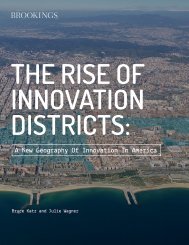TECHNOLOGY AT WORK
1Oclobi
1Oclobi
You also want an ePaper? Increase the reach of your titles
YUMPU automatically turns print PDFs into web optimized ePapers that Google loves.
88<br />
Citi GPS: Global Perspectives & Solutions February 2015<br />
Making Growth Inclusive<br />
Tax reform is part of the answer to making<br />
growth inclusive again…<br />
A key challenge of the 21 st century will be to make growth inclusive again. Tax<br />
reform provides part of the answer. At a time when the ever falling cost of computing<br />
makes it cheaper to displace workers with technology, while consumers benefit from<br />
declining prices of many products and services, shifting tax burdens from labour<br />
towards consumption would be a step forward. For example, a reduction in income<br />
and payroll taxes would make it cheaper to hire, while a luxury tax on positional<br />
goods could make up for some of the fall in tax revenues.<br />
Taxes can also be shifted from labour towards wealth, including capital and income<br />
from assets. As proposed by Thomas Piketty, the wealth gap that has emerged<br />
between owners of capital and those who rely on their labour could be combatted<br />
by a global wealth tax. Although such a tax is unlikely to get implemented, some<br />
proposals are underway. In Europe, a financial transaction tax has been put forward<br />
and in the UK a tax on mansions worth over £2 million has also been proposed. In<br />
addition, tax avoidance, evasion and loopholes are also being explored.<br />
…but it is crucial that the tax system channel<br />
funds into public investment that boost<br />
growth in an inclusive manner<br />
Promoting self-employment could be a good<br />
way for governments to capture the<br />
opportunities created by the digital<br />
revolution<br />
Inclusive growth requires more investment in<br />
skills and training to prepare workers for the<br />
jobs of the future<br />
It would be a mistake, however, for governments to focus too narrowly on the<br />
redistribution of income. Although taxation as such can clearly help combat<br />
inequality, the crucial task of the tax system must be to channel funds into public<br />
investment that boosts growth in an inclusive manner. As has been highlighted in<br />
this report, the main risk for both investors and workers is a future of secular<br />
stagnation, driven by a decline in the demand for new goods and services. Such a<br />
scenario can only be avoided by embracing technological progress, while making<br />
the right investments to create growth and new employment opportunities. As<br />
shown by Thomas Piketty himself, a faster growth rate reduces the importance of<br />
wealth in a country, while sluggish growth will increase it. Technological progress is<br />
thus an essential ingredient of inclusive growth: while it creates new income it also<br />
destroys old wealth.<br />
To ensure continuous creative destruction governments need to capture the<br />
opportunities created by the digital revolution. Crucially, while digital technologies<br />
are making tasks previously confined to labour automatable, they are also making it<br />
cheaper for entrepreneurs to start their own business: e-entrepreneurship typically<br />
requires less capital investment, and digital technologies allow people in deprived<br />
areas to reach global markets, as even more traditional goods are made<br />
increasingly mobile. In other words, digital technologies have made selfemployment<br />
an option to a growing share of workers. As recent survey evidence<br />
also shows that people in self-employment were more content in their working lives,<br />
there are good reasons to believe that more people will choose to start their own<br />
business. Indeed, the future of work may well be one where self-employment is the<br />
new normal. The main challenge for economic policy is thus to encourage more<br />
entrepreneurial risk-taking. Reducing red tape and implementing tax systems that<br />
do not discourage self-employment is crucial, but building welfare systems that cap<br />
the downside to entrepreneurial failure may also help.<br />
Nevertheless, as technology is increasingly taking the form of capital that displaces<br />
labour, technological progress also risks leaving many people behind. According to<br />
research by Carl Benedikt Frey and Michael Osborne, as many as 47% of US jobs<br />
are at risk of automation over forthcoming decades. Inclusive growth thus requires<br />
fostering creative destruction while ensuring that ordinary workers are able to shift<br />
into new job opportunities as existing occupations and industries are being eroded.<br />
To successfully manage this transition, more investment in skills and training is<br />
required to prepare workers for the jobs of the future.<br />
© 2015 Citigroup










